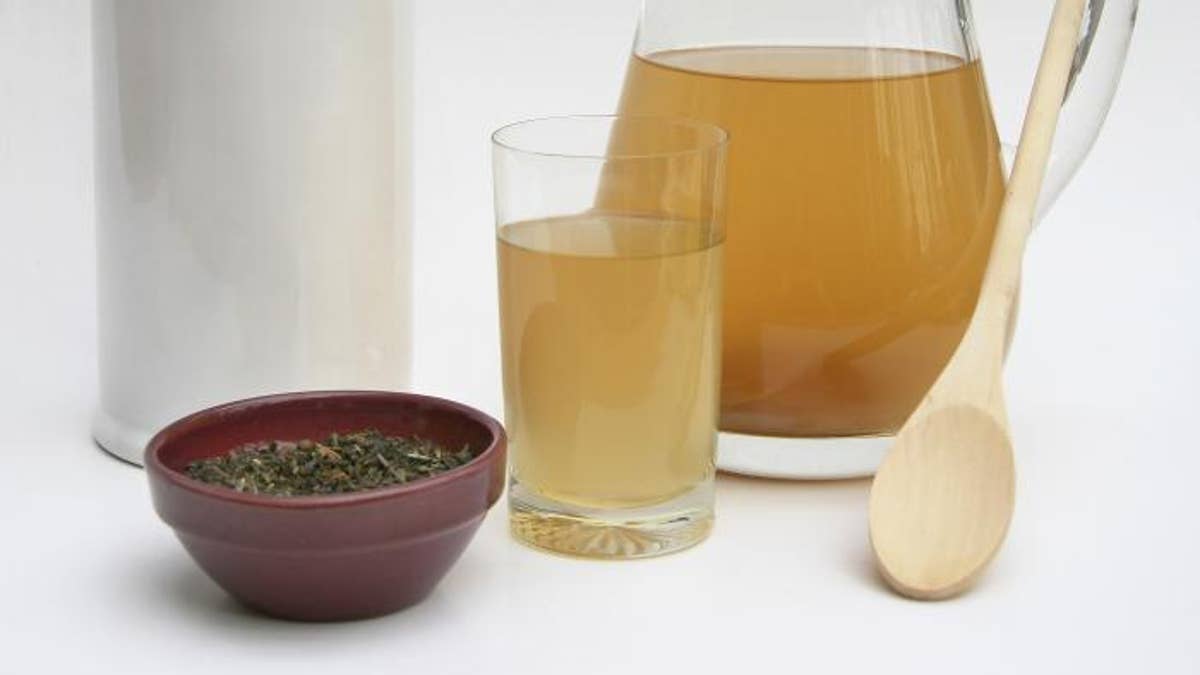
Would you spend a few bucks for an elixir that can reportedly give you a good night’s sleep, aid in weight loss, promote hair growth, and even prevent cancer? Celebrities like Madonna, Gwyneth Paltrow, and Halle Berry reportedly make this so-called fountain of youth part of their high-profile lives, but what is kombucha anyway?
This fermented tea may be hot now, but it’s not exactly new. Made by fermenting black tea with a thick, mushroom-like culture of yeasts and bacteria, kombucha is said to have originated in ancient China and has been savored for centuries to (supposedly) keep the body healthy.
“The Chinese called kombucha the ‘immortal health elixir’ over 2,000 years ago due to the health benefits they believed it could deliver, like preventing and fighting cancer, arthritis, and other degenerative diseases,” explains nutrition expert Jayson Calton. “While there are limited amounts of research done on the beverage itself, there has been lots of research done on the many benefits of micronutrients and acids it contains, including B-vitamins, antioxidants, and glucaric acids.”
Kombucha, which was once only found self-brewed, is now readily available at local stores. Brand versions of the tea like Synergy, can be found in bottle form, appealing to those not wanting to deal with the fuss or mess of preparing kombucha at home. Celestial Seasonings also offers their own variation of bottled kombucha made with “clear Colorado water.” And for those needing a quick pick-me-up, Celestial Seasonings also offers a kombucha energy shot that’s fueled with guarana and ginseng. With kombucha more accessible than ever, it’s no wonder many are curious to try it.
But is it all it's cracked up to be?
“Kombucha claims to aid digestion, sleep, weight loss and detoxification, stimulate the immune system, prevent cancer, stop hair loss, improve liver function, and brighten skin,” says Dr. Ariel Ostad, of the American Academy of Dermatology who frequently lectures on skin cancer. “A-listers like Madonna and Gwyneth Paltrow have been snapped drinking kombucha, which definitely helps sway consumer in thinking that it’s the key to staying young and healthy.”
“However, when it comes to hard science on these topics, there is little to be found,” he adds.
According to the American Cancer Society, “no human studies have been published in the available scientific literature that support any of the health claims made for kombucha tea.” The organization also points out that since preparation methods can vary, kombucha may include contaminants, such as molds and fungi, which can cause illness.
Nutritionist Franci Cohen says to think twice before consuming kombucha daily.
“I would not recommend kombucha to clients,” explains Cohen. “The main drawback is how bacteria can be so easily introduced, thereby contaminating the beverage and inviting a host of unwanted ailments to the drinker. If you are buying prepared kombucha, make sure it’s pasteurized, which kills the cultures. If you want to prepare it yourself, make sure your utensils are clean to avoid bacteria from contaminating your drink.”
Cohen also points out that kombucha contains 0.5% of alcohol and if it sits too long, the percentage can go up as it continues to ferment.
“As this fermentation continues, the tea’s health benefits diminish and harmful side effects can occur from drinking,” she adds. “Steer clear of this mysterious drink that lacks any solid scientific credit.”
Those hoping kombucha can help reach weight-loss goals may also want to look carefully at labels. Medical experts say that some brands that have sweetened flavors to mask the “sour" and "vinegar-like” taste of kombucha can pack on the pounds.
“Many commercial kombucha drinks contain added sugars and other sweeteners to give the drink palpability,” says celebrity nutritionist JJ Virgin. “They can become an expensive habit that can raise blood sugar.”
Want to give kombucha a try? It’s recommended to first seek the advice of a doctor to ensure the tea won’t cause any potential health complications. And while buying a prepared, bottled version is always a safer option then attempting to brew at home, it’s also important to understand what it cannot achieve.
“Despite the increasing demand for this claimed health-inducing drink, the benefits of this beverage still remain unclear,” says dietitian Laura Cipullo. “There is still lack of research. (Kombucha) is not a miracle worker and we don’t recommend you to drink it with the mindset that this drink, alone, will make you healthy.”

